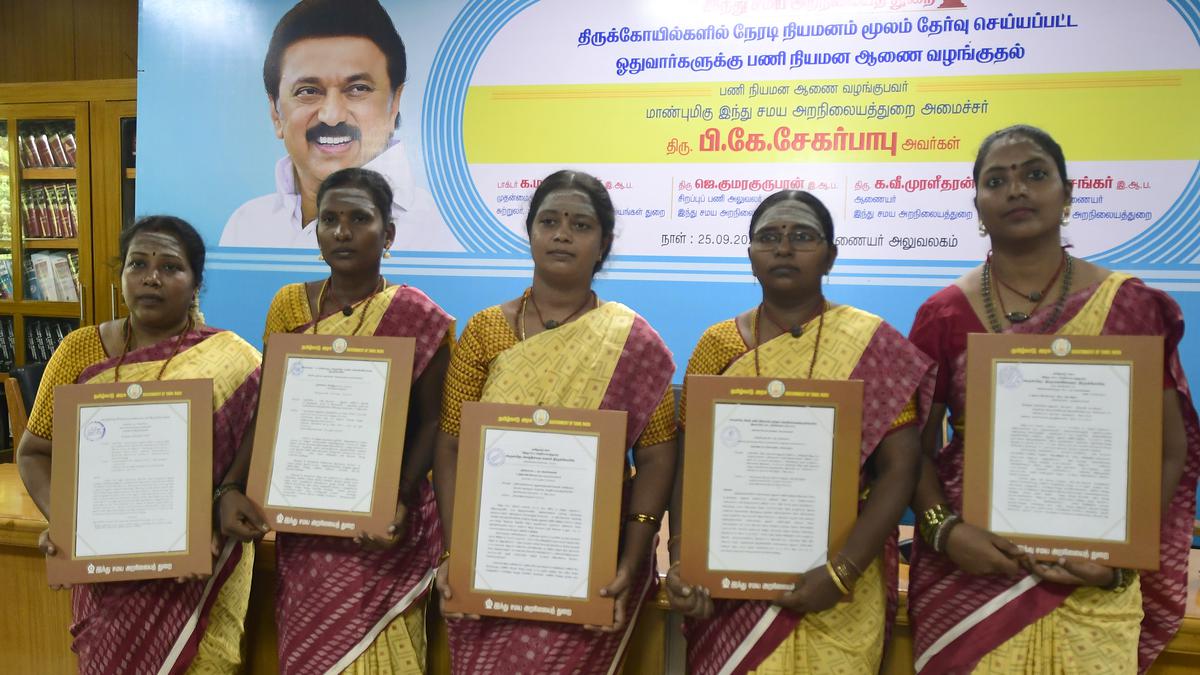
More women become Odhuvars in T.N. temples
The Hindu
Women Odhuvars from varied backgrounds receive appointment orders to serve deities in Saivite temples in Chennai region. Minister P.K. Sekarbabu, due to Chief Minister M.K. Stalin's support, appointed 10 women in 28 months. C. Sivaranjani, M. Gomathi, Charumathi Keeran, M. Dharani, and Bhargavi Kamalakkannan, who trained in Thirumurai and music, are among those appointed. Jagathrakshaki Kalyani and Su. Suhanjana Gopinath, already serving as Odhuvars, are thankful for family support. They found their calling to serve the Lord through Thirumurai songs.
These women come from varied backgrounds but have a single goal – to work as Odhuvars in Saivite temples and to be in the service of the deities by singing their praise through the pathigams. The women – C. Sivaranjani, M. Gomathi, Charumathi Keeran, M. Dharani, and Bhargavi Kamalakkannan – said they did not expect to be recruited for the job despite having trained in the Thirumurai and music.
Minister for Hindu Religious and Charitable Endowments (HR&CE) P.K. Sekarbabu on Monday handed over appointment orders to 15 Odhuvars, of which five were women and have been appointed to temples in the Chennai region. “In the last 28 months, 10 women Odhuvars have been appointed in various temples, and it has been made possible due to Chief Minister M. K. Stalin giving a free hand to the department to function. Odhuvars are a must in Saivite temples. They have to sing from the Thirumurai during each puja and also during special functions and festivals. I am happy to see women who have trained specially to be in the service of the deities,” he said, adding that of 187 vacant Odhuvar posts in the temples, 107 had been filled.
Ms. Keeran, the mother of two children and wife of a panchayat president of Keerapalayam, near Chidambaram, who joined duty at the Siddhi Buddhi Vinayakar temple in Royapettah, said she had studied the Thevaram course at Annamalai University by chance. “It was another candidate, Dharani, who showed me the way. When I was working as a business development officer at a local gramin bank, I went to the Chidambaram temple regularly. I heard Dharani singing there and asked her where she learnt the skill. Though the university told me I was overage (she is now 42) initially, they eventually approved my application. I will move to Chennai and work hard,” she said.
Ms. Kamalakkannan, who has an MBA in finance and has been working as an accountant, said she found her calling as a child when she found a Shiva Lingam. “I will join the Thiruvalleeswarar temple in Padi, where I started singing as a child,” she said.
Jagathrakshaki Kalyani and Su. Suhanjana Gopinath, who have been serving as Odhuvars for a year-and-a-half and two years respectively, said they had been able to sustain in their jobs thanks to the support of their families. “I used to sing from the Thirumurai from a young age and some relatives used to make fun of me and if I was planning to become Avvaiyar. But, to me this job is very precious since I used to yearn to sing to the deities from my childhood,” said a visibly moved Ms. Kalyani, who has been working at the Vedapureeswarar temple in Thiruverkadu.
Ms. Gopinath, who has been working at the Dhenupureeswarar temple, said though she had gone to learn Carnatic music at the Karur Music College, she was advised to learn the Thirumurai by a senior in the college. “My teacher told us to keep our trust in the Thirumurai, and today, those songs have lead me to my job, through which I can serve the Lord,” she said.

“Writing, in general, is a very solitary process,” says Yauvanika Chopra, Associate Director at The New India Foundation (NIF), which, earlier this year, announced the 12th edition of its NIF Book Fellowships for research and scholarship about Indian history after Independence. While authors, in general, are built for it, it can still get very lonely, says Chopra, pointing out that the fellowship’s community support is as valuable as the monetary benefits it offers. “There is a solid community of NIF fellows, trustees, language experts, jury members, all of whom are incredibly competent,” she says. “They really help make authors feel supported from manuscript to publication, so you never feel like you’re struggling through isolation.”

Several principals of government and private schools in Delhi on Tuesday said the Directorate of Education (DoE) circular from a day earlier, directing schools to conduct classes in ‘hybrid’ mode, had caused confusion regarding day-to-day operations as they did not know how many students would return to school from Wednesday and how would teachers instruct in two modes — online and in person — at once. The DoE circular on Monday had also stated that the option to “exercise online mode of education, wherever available, shall vest with the students and their guardians”. Several schoolteachers also expressed confusion regarding the DoE order. A government schoolteacher said he was unsure of how to cope with the resumption of physical classes, given that the order directing government offices to ensure that 50% of the employees work from home is still in place. On Monday, the Commission for Air Quality Management in the National Capital Region and Adjoining Areas (CAQM) had, on the orders of the Supreme Court, directed schools in Delhi-NCR to shift classes to the hybrid mode, following which the DoE had issued the circular. The court had urged the Centre’s pollution watchdog to consider restarting physical classes due to many students missing out on the mid-day meals and lacking the necessary means to attend classes online. The CAQM had, on November 20, asked schools in Delhi-NCR to shift to the online mode of teaching.









